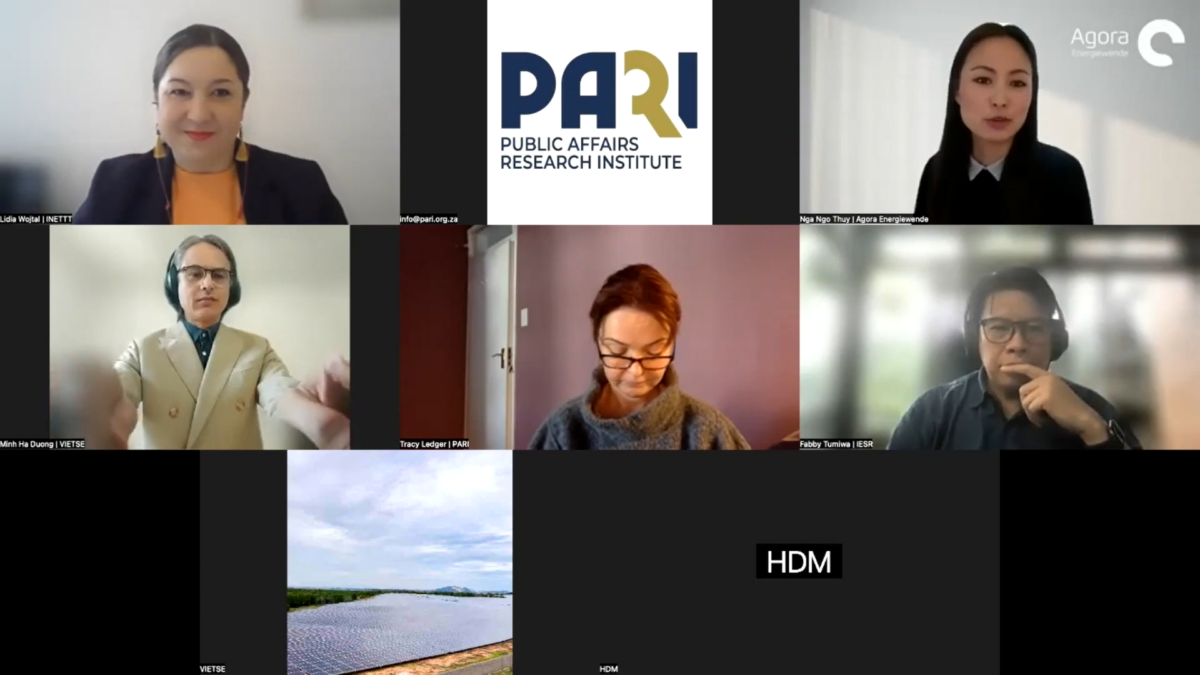Jakarta, 18 April 2023 – Addressing the climate change issue needs not only commitment but it requires a huge amount of resources. Financing has become one of the biggest challenges for countries like Indonesia which rely on coal plants and need to transform them into renewable-based power generation to cut emissions from the power sector. This definitely needs huge financing.
International Partnership has committed to distributing funding to several countries to accelerate the energy transition. The funding is called the Just Energy Transition Partnership. Until April 2023, two countries i.e., South Africa and Indonesia, received the funding commitment.
Vietnam, one of the Asian countries that rapidly developed renewable energy in the past few years, is in intensive communication to receive the funding. Minh Ha Duong, chairman of the Member Council VIETSE, during the webinar “Between Vision and Reality: Navigating JETP in South Africa, Indonesia, and Vietnam” said that the JETP will “reheat” the development of renewables in Vietnam.
“For several years, we can say that the renewable development in Vietnam is booming until we can have several gigawatts of renewable energy online, but it’s frozen lately. Therefore, this JETP will reheat the development so that we can have more renewables online,” he said.
South Africa, which became the first country to receive JETP, noted points worth considering for other countries and the IPG members in replicating the project in other countries.
“The JETP financing acts more like a catalyst during the energy transition process. Sure, it is not enough to cover the whole fund needed to transform the power sector and its social, and economic impact but it still can accelerate the transition,” Tracy Ledger, energy transition program lead at Public Affairs Research Institute (PARI) said. Tracy highlighted that public participation during the JETP negotiations was very limited.
Securing the JETP commitment of USD 20 billion during the G20 meeting last November, Indonesia has established a dedicated task force for JETP under the Ministry of Energy and Mineral Resources.
Institute for Essential Services Reform (IESR), which is actively involved in and reviews the energy sector in Indonesia and continuously gives input to definite policy makers, points out that the USD 20 billion is what is committed, but the disbursement can be dependent on many things. Therefore, Indonesia needs to prepare the ecosystem to welcome the funding.
The Indonesian government at least needs to work on the following issues: availability of bankable projects, a definite auction schedule for renewable plants, and an enabling environment for developers kicking their projects in Indonesia.
“We also need to define what is meant by ‘just’ in the JETP term. Our (IESR) context of ‘just’ involves labor and economic transition especially those who are in coal production provinces,” Fabby Tumiwa, executive director of IESR explained.
Indonesia’s JETP deals target emission reduction of 290 million tons of CO2 and a renewable mix of 34% by 2030. This target requires coal phase-out as a prerequisite for cutting down emissions from the power sector. As one of the impacts, coal production will drastically decrease and it will impact the coal-producing regions such as East Kalimantan, and South Sumatra.
Local economic activity will definitely shift as the mentioned provinces rely heavily on coal production for their gross domestic product. The quality of energy access that differs from one place to other challenges Indonesia’s JETP implementation.
“The 34% target of renewables is not enough to decarbonize Indonesia’s energy system but it’s a good start to accelerate renewable energy utilization, nor the USD 20 billion. Yet, it can unlock more opportunities for energy transition,” Fabby said.
Fabby added that the establishment of renewable energy industries like battery and solar panel manufacturing become one of the keys to the success of the energy transition.

